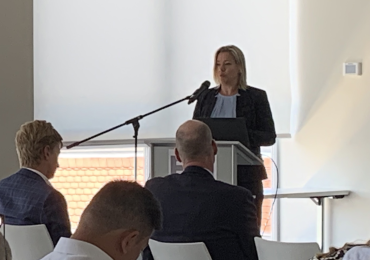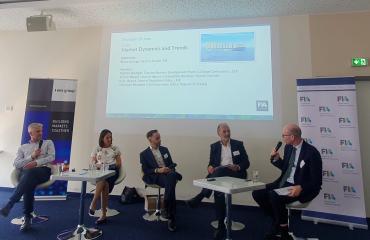FIA held a forum in Leipzig, Germany on 29 June, bringing together market participants and regulators to discuss recent energy market events, regulatory responses and areas for future growth in the energy and commodities trading and clearing arena.
The event began with a keynote address from Froukelien Wendt, director for CCPs at the European Securities and Markets Authority and a member of ESMA’s CCP Supervisory Committee. Wendt discussed ESMA’s analysis of trading behaviour as events unfolded in the European energy derivatives market last year and the authority’s policy responses to the energy crisis.
After war broke out in Ukraine, high margin calls from CCPs put significant pressure on clearing members and trading participants, especially non-financial companies, Wendt said. These firms sought solutions such as revolving credit facilities or additional credit lines, reduced dividends, or private equity financing to access necessary cash for liquidity purposes.
While banks initially supported their clients by providing additional credit lines, they eventually ceased extending credit to smaller or less established commodities traders to meet prudential risk requirements. This put further stress on non-financial companies in need of liquidity, Wendt noted.
The first visible change in trading behaviour that ESMA saw from market participants was a move away from exchange trading and central clearing towards OTC trading and bilateral clearing, particularly among non-financial companies.
“Though these moves may have reduced liquidity stress, there is a trade off with counterparty risk increasing, and a reduction in market liquidity,” she said. “We also saw a reduction in hedging activity by energy firms, in particular for longer maturities, exposing firms to higher market risk. A side effect of this is that reduced hedging activity impacts market liquidity with lower depth and wider bid-ask spreads.”
Discussing the policy responses of public authorities, Wendt highlighted ESMA’s review and temporary extension of the list of eligible collateral that could be posted as margin at CCPs under EMIR. ESMA also published a report about the European Commission’s “Market Correction Mechanism” regulation, saying it could have a negative effect both on market participants’ trading behaviour and the ability of market participants to effectively manage their risks.
Other measures ESMA is working on include revising how margin transparency can be enhanced, in terms of both the transparency of CCPs vis-à-vis clearing members and the transparency of clearing members vis-à-vis clients.
“Finally, as part of ESMA’s regular CCP stress test, we incorporated an analysis of the resilience of CCPs under real-life shock events. An outcome of the most recent stress test is that there is room for improvement at certain CCPs in setting their concentration risk add-ons,” Wendt said.
Commodities regulation
The first panel of the forum discussed recent policy developments in commodities markets, including regulatory intervention during volatile market conditions.
None of the panellists were in favour of the Market Correction Mechanism introduced this year by the European Commission to set a price ceiling on natural gas futures. The price cap applies to prices on the Dutch Title Transfer Facility, the reference point for the most actively traded futures contract, as well as other trading hubs if they exceed €180 per megawatt-hour for more than three consecutive working days. The TTF price must also be €35 per megawatt-hour higher than a reference price based on existing liquefied natural gas price assessments for three days.
For Martin Rose, EMIR and MiFID expert, Federal Financial Supervisory Authority at German regulator BaFin, the price cap carries inherent risks of fragmentation and shifting transactions to places where European regulators do not have oversight. In particular, he pointed to the risk that if the Market Correction Mechanism is triggered, people could quickly leave the market, for example, off-exchange or to EEX’s organised trading facility or ICE’s Endex in the UK, where the cap does not apply.
The market participants on the panel said the price cap undermines the critical risk management function of derivatives markets and cautioned against measures that intervene with natural price formation.
The panellists also discussed recent proposals from the European Parliament in relation to the MiFID II/MiFIR Fundamental Review, including an adjustment of the position limits regime and a review of the ancillary activity exemption, as well as a mandate for ESMA to define the principles for establishing the technical parameters of exchanges’ circuit breakers.
“Circuit breakers are there to halt very erratic trading. What they cannot do is get rid of volatility that is really stretched out over days,” said Anje Stiers, head of EEX’s EU Representation Office in Brussels.
The review of the Regulation on Wholesale Energy Market Integrity and Transparency (REMIT) also came under the spotlight with panellists expressing their concerns about draft amendments in the legislative proposal. These include a proposal for market participants established in a third country to declare an office in a member state in which they are active and to register with the national regulatory authority of that country.
The panellists noted that this would be onerous for third-country market participants who use the EU energy and power markets for risk management purposes and would have a negative impact on the liquidity of these markets.
Market trends
The final panel of the forum focused on how recent extreme volatility has impacted the use of derivatives products as well as how the market is facilitating and enabling the "green" agenda with the development of new products.
Looking at the energy crisis last year, Steffen Riediger, director of business development, power and global commodities at EEX, said the markets were under tremendous pressure but are now growing again.
“If we look at the end of August last year when German power contracts reached all-time peaks, the industry was asking, ‘Is the market still trading in a fair orderly manner?’ We had previously established forums with our Exchange Council to carry out consultations to check that markets were still running in a fair and orderly way, and we had fire drills to ensure that markets were fair and orderly, and markets did work at all times,” Riediger said.
“The markets provided the right signals that helped to keep the lights and heating on through winter. Because of the prices and the signals, consumption declined quite significantly. We have to keep markets open because price signals are important. When we look at this now in 2023, there’s a completely different mood and the market is growing again. The industry digested last year's events very well.”
Discussing how the markets can help drive the green agenda, Riediger pointed to the importance of having the right products and tools to incentivise investments into renewables.
“If we look at the share of renewables in the current power mix in Germany, around 50% of electricity comes from renewables and we want to increase that to 80% by 2030. We want to go for 80% across Europe by 2035 to 2040, so renewables are the way out when it comes to energy independence and independency from fossil fuels,” he said. “We really have to invest collectively into renewables and for us as markets, that means providing the right products and the right tools in order to incentivise these investments.”
Panellists also discussed the role the futures markets can play in the transition to sustainable products with Katy Hyams, head of regulatory policy at the London Metal Exchange, saying that their role is pivotal.
“We as the metals market believe that metals are central to the transition to sustainable financing and the transition to a sustainable future. It's things like electric vehicles, turbines and solar panels… there is an element of metal that goes into the manufacturing of these products, and we want to ensure that we have those contracts available to support those developing and growing industries,” Hyams said.
Other topics under discussion included the importance of ESG regulatory standards, the Green Taxonomy and disclosures and energy transition challenges.
FIA will continue its 2023 European events with a forum in Frankfurt on 12 October. The forums provide an opportunity for policy makers and industry participants to engage in productive conversations about the current issues affecting their markets.
Visit FIA.org/events for more information on conferences taking place this year.




